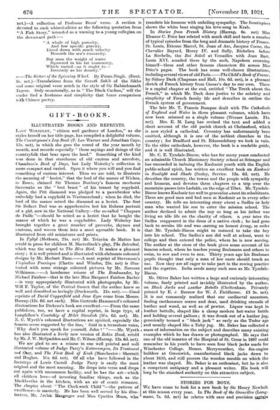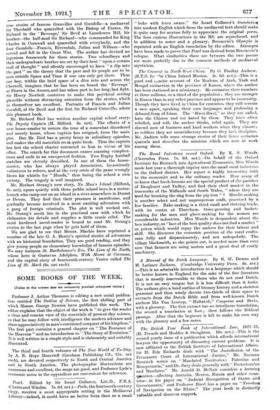STORIES FOR BOYS.
WE have come to look for a new book by Sir Henry Newbolt at this season every year. In The Book of the Grenrilles (Long- mans, 7s. Gd. net) he relates with ease and precision wet*
tine stories of famous Grenvilles and Grenfells—a mediaeval Sir Thoobald who quarrelled with the Bishop of Exeter, Sir Richard in the ' Revenge,' Sir Bevil at Lansdowne Hill, his brother—the half-mad Sir Richard—who commanded for King Charles in Cornwall and quarrelled with everybody, and-the four Grenfells—Francis, Riversdale, Julian and William—who served and fell in the Great War. The author has devised an ingenious framework for these stories. Two schoolboys and their undergraduate brother are set by their host upon a certain trail of thought " and silently encouraged to have " a dip into the past " on the theory that the past and its people are to be seen outside Space and Time if one can only get there. Thus one boy, within the brief space of a dive into and across the Cherwell, imagines that he has been on board the Revenge' at Flores in the Azores, and has taken part in her long, last fight.
Sir Henry Newbolt contrives to make this psychical setting plausible without distracting attention from the stories, which in themselves are excellent. Portraits of Francis and Julian Grenfell, of Sir Bevil and the first Sir Richard Grenville, adorn this pleasant book.
Mr. Richard Bird has written another capital school story, The Deputy Captain (H. Milford. 6s. net). The efforts of a new house-master to restore the tone of a somewhat disordered and unruly house, whose captain has resigned, form the main plot. But Mr. Bird has a pretty fancy in subsidiary episodes, and makes the old materials seem quite fresh. Thus the captain has lost the school charter entrusted to him in virtue of his office. The search for this document causes amusing complica- tions and ends in an unexpected fashion. Two Rugby football matches are cleverly described. In one of them the house- master, who has always played Association, incautiously
volunteers to referee, and at the very crisis of the game wrongly blows his whistle for " Hands," thus losing the school a sure victory. The tragedy is well imagined.
Mr. Herbert Strang's new story, No Man's Island (Milford, as. net), opens quietly with three public school boys in a motor- launch who camp out on an island in a river somewhere in Dorset or Devon. They find that their presence is unwelcome, and gradually become involved in a most exciting adventure with a gang of foreign criminals. The plot is well worked out. Mr. Strang's merit lies in the practised ease with which he elaborates his details and supplies a little comic relief. The most hardened novel-reader is bound to read Mr. Strang's stories to the last page when he gets hold of them.
We are glad to see that Messrs. Blackie have reprinted a number of the late G. A. Henty's spirited stories of adventure with an historical foundation. They are good reading, and they give young people an elementary knowledge of famous episodes. We may instance St. Bartholomew's Ere, The Lion of the North, whose hero is Gustavus Adolphus, Witt► Moore at Corunna, and the capital story of fourteenth-century Venice called The Lion of St. Mark (6s. net each).







































 Previous page
Previous page